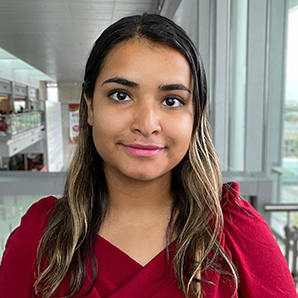Why did you choose graduate school at IUPUI?
IU School of Medicine (IUSM) offers a great umbrella program for incoming biomedical science PhD students, where you get to experience research in multiple different subdisciplines before picking a lab and an advisor. This gave me a scope to explore my scientific interests and join a lab that was ultimately best suited for my career development and research trajectory. The IUSM administrative staff were very good at reaching out to me pre-decision making and gave me all the information I needed to accept this PhD offer.
What has been your favorite academic accomplishment since you’ve been here?
In Summer 2023, I received a predoctoral fellowship from the Alzheimer’s Disease Neuroimaging Initiative (ADNI) to continue my work in understanding the impact of vascular risk factors in Alzheimer’s Disease. I am also very grateful for the Paul and Carole Stark Neuroscience Fellowship by the Stark Neurosciences Research Institute (SNRI) that funded my 2nd year of doctoral studies. Additionally, as a biomedical scientist, it was humbling to not just pass but get a good grade in a Machine Learning class I took last Spring; I have been savoring the joy of that small accomplishment.
What do you enjoy most about life in Indianapolis?
Having done my undergraduate education in a small western town, I am grateful for all the food Indianapolis has to offer; it really gives me so many options that I get to experience food all over the world. I am also very happy with the running culture in Indianapolis as I have access to more road and trail races than ever before and get to do something every weekend. Indianapolis is central to a lot of hiking and climbing recreational areas, and I really appreciate that about it as the Midwest isn’t known for great hiking usually. In Indy you can always take the drive to Red River Gorge or the Smokies.
Please provide some details about your work/research as a graduate student and/or any activities you are involved in.
It’s been very exciting to be a part of the IUPUI community in various capacities.
In my current research, I focus on vascular risk factors that disproportionately affect diverse populations and consequently cause Alzheimer’s Diseases (AD); this line of research is inspired by my passion for public health advocacy for equity in ADRD research and the need to tailor personalized therapeutics for disproportionately affected racial and ethnic populations. In my current research lab, my work is strengthened by the daily collaboration with my diverse colleagues, peers, and mentors. Their expertise in multi-disciplinary areas of neuroimaging and genetics, enriches my research as well as my worldview.
Outside of research, I am involved with several DEIJ initiatives in Stark, IUSM, and broadly IUPUI. I was elected as Student Development Officer for the Medical Neuroscience Student Government (MNGO) to mentor, train, and build a support network for early career-PhD students. I continue to serve as an Indiana University Graduate Emissary for Diversity, recruited by the IUPUI Assistant Vice Chancellor for Graduate Education. I also serve as Journal Committee Chair of the IUPUI Biomedical Informatics Club.
As the focus of my research has been on how cardiovascular and cerebrovascular risk factors contribute to vascular dysregulation in AD in multiethnic populations, I have consistently worked on making the science I do more accessible to non-scientific audiences as well as experts from non-neuroscience fields given the immense public health relevance of the work I do. To that end- I have represented the IADRC at the Indiana State Capitol for the Indiana Science Communication Day and presented the research done at our center to Indiana senators and representatives to convey the importance of funding AD-related genetics and neuroimaging research in the state of Indiana. I serve as the Vice-Chair for Science Communication at National Science Policy Network (NSPN) as well as the Education Lead for the Science DEI committee at the same organization. My day-to-day involvement with NSPN underscores my dedication to science communication and policy advocacy, skills that are integral in bridging the gap between research and society


